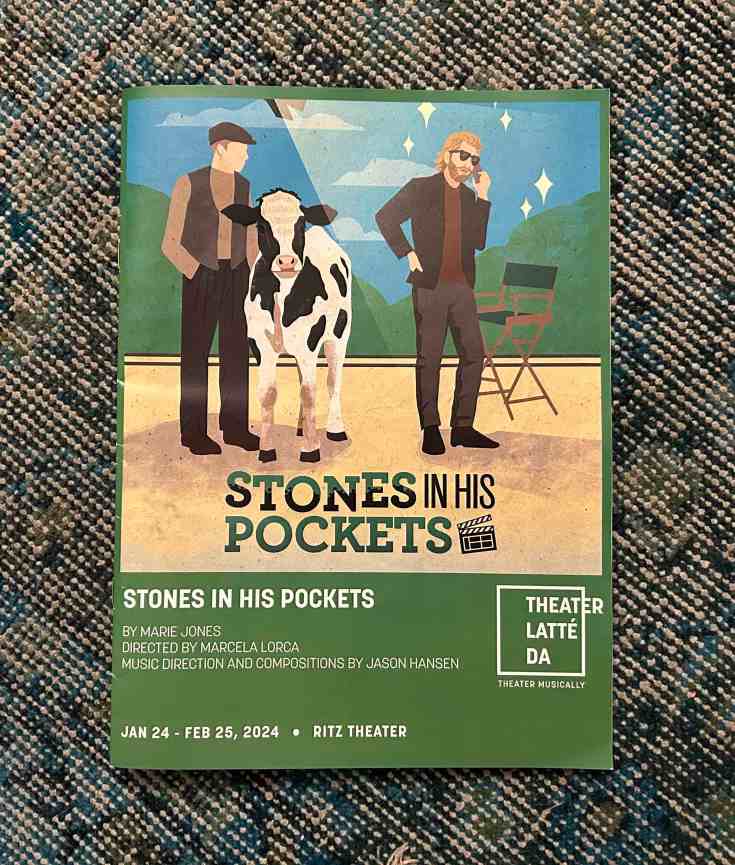Theatermakers today are grappling with a question that’s also vexing the wider culture sphere, from movies to literature: Who gets to tell certain stories?
When the cast was first announced for the national tour of Funny Girl, some in the theater community decried the casting of Katerina McCrimmon in the lead role of Fanny Brice, as Brice was a real Jewish woman, but McCrimmon is not, even though the production reportedly said it was “specifically seeking actors of Jewish heritage” for the role. When the musical rolled into town last month, though, no one seemed to pay this criticism any mind. Meanwhile, Mixed Blood Theatre is set to debut the play Full Range this summer which is not only “based on interviews with people from across the Iron Range,” but “will be performed in the Iron Range” — not in Minneapolis — “with Rangers on stage and backstage.” Representation in casting, staffing, and audience is top of mind today, even if it’s not always acted on.
The Theater Latté Da production of Stones in His Pockets, running at the Ritz through February 25, doesn’t initially seem to run into the identity roadblocks that are discussed these days. The two-person play is set in a small Irish town where Jake Quinn (Reed Sigmund) and Charlie Conlon (Tom Reed) are extras in a splashy Hollywood movie that’s come to film in the bucolic community. The story isn’t limited to these two perspectives, though — writer Marie Jones has populated this tale with a dozen or so other characters, but they’re all played by Sigmund and Reed, including a vain leading lady, a screeching assistant director, and a local who had big dreams, like Jake and Charlie, but exchanged them for a bottle.
If two actors rotating through a Rolodex of wisecracking locals and pompous Americans sounds difficult to parse, director Marcela Lorca and costume designer Sarah Bahr have made the audience’s job easier with signature accessories denoting certain characters. Music director Jason Hansen has also contributed to the character clarification effort. He composed new music for this play, assigning certain themes to certain roles; that’s him on stage going back and forth between piano, keyboard, guitar, and percussion (sometimes two at once!) alongside violinist Susan Crawford or Theresa Elliott (who switch off performances). There’s also dialect coach Jill Walmsley Zager who has helped Reed and Sigmund employ different variations on the Irish language. Conquering half a dozen characters and a convincing Irish accent wasn’t enough — these actors had to pin down multiple Irish accents.
For most of the first act, this theatrical feat is a pleasure to watch and performed seamlessly. If the antics of Charlie and Jake, who in one scene overact in the background of a shot while digging turf, don’t inspire peals of laughter, there’s subdued merriment to spare. That’s not to say these actors don’t try to pull big laughs out of the audience — Sigmund’s portrayal of Aisling, a female assistant director, is 80% full-throated, high-pitched squawking.
The play runs into problems when it sticks a dramatic stick in the spokes. Near the end of the first act, a young local named Sean Harkin is embarrassed in front of the townspeople by the film’s star, Caroline Giovanni; the next day, it’s discovered that he’s killed himself by walking into the ocean with “stones in his pockets.” Besides the abruptness of the tonal shift, in a story that has so far been outright comedy accented by Hansen’s romantic Irish music, this tragic plot development leads to the problems with representation.
The second act balances along a simple dichotomy: the Hollywood crew wants to keep the production on schedule and budget, but the Irish extras want to pause the filming to properly mourn their family, friend, and neighbor. The cliché, melodramatic nature of American movies is derided, but Charlie and Jake have another idea: what if they wrote a real Irish script, by real Irish people, and filmed a real Irish movie? “We have the right to tell our story the way we want it,” Jake says. Unfortunately, the story they want to tell to finally get their big break is the story of Sean’s death — not their own story, but the one of the teenager who killed himself.
The effect of all this is that Stones in His Pockets ends up feeling like the type of entertainment that it’s critiquing. The equally corny and self-righteous American film industry is being skewered, but the reality of two American actors playing Irish people in front of an American audience brings those same qualities to the piece itself. As Lorca writes in her note in the program, one of the play’s big themes is cultural appropriation, but it seems Jones’s story would get its message across more effectively if Irish actors were the ones wrestling with that theme (the original Broadway production featured Conleth Hill, who you may know as Varys in Game of Thrones, and Sean Campion, who are both Irish).
Should only Irish people play Irish characters? Of course not. The art of acting is built on empathy. Actors are entrusted with understanding and bringing to life characters who are completely different from themselves, and that is going to extend to different backgrounds and cultures. That doesn’t mean all plays can be executed with the same efficacy as long as the artists are talented enough. Theater Latté Da has once again assembled a talented team here, but they would have been better served in a different show.
Stones in His Pockets
Theater Latté Da
The Ritz Theater345 13th Ave. NE
Minneapolis, MN 55413
January 24 – February 25, 2024
Buy tickets here
